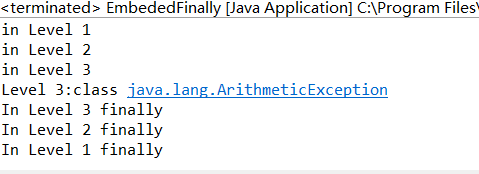關於異常的簡單認識
阿新 • • 發佈:2018-11-10
(1)多層的異常捕獲1
package Demo1; public class CatchWho { public static void main(String[] args) { try { try { throw new ArrayIndexOutOfBoundsException(); } catch(ArrayIndexOutOfBoundsException e) { System.out.println("ArrayIndexOutOfBoundsException" + "/內層try-catch"); } throw new ArithmeticException(); } catch(ArithmeticException e) { System.out.println("發生ArithmeticException"); } catch(ArrayIndexOutOfBoundsException e) { System.out.println("ArrayIndexOutOfBoundsException" + "/外層try-catch"); } } }
結果:

(2)多層的異常捕獲2
package Demo1; public class CatchWho2 { public static void main(String[] args) { try { try { throw new ArrayIndexOutOfBoundsException(); }catch(ArithmeticException e) { System.out.println( "ArrayIndexOutOfBoundsException" + "/內層try-catch"); } throw new ArithmeticException(); } catch(ArithmeticException e) { System.out.println("發生ArithmeticException"); } catch(ArrayIndexOutOfBoundsException e) { System.out.println( "ArrayIndexOutOfBoundsException" + "/外層try-catch"); } } }
結果:

(3)多層異常捕獲3
public static void main(String args[]) { int result; try { System.out.println("in Level 1"); try { System.out.println("in Level 2"); // result=100/0; //Level 2 try { System.out.println("in Level 3"); result=100/0; //Level 3 } catch (Exception e) { System.out.println("Level 3:" + e.getClass().toString()); } finally { System.out.println("In Level 3 finally"); } // result=100/0; //Level 2 } catch (Exception e) { System.out.println("Level 2:" + e.getClass().toString()); } finally { System.out.println("In Level 2 finally"); } // result = 100 / 0; //level 1 } catch (Exception e) { System.out.println("Level 1:" + e.getClass().toString()); } finally { . System.out.println("In Level 1 finally"); } }
結果:

(4)finally語句是否一定會執行?
public static void main(String[] args) { try{ System.out.println("in main"); throw new Exception("Exception is thrown in main"); //System.exit(0); } catch(Exception e) { System.out.println(e.getMessage()); System.exit(0); } finally { System.out.println("in finally"); } }
結果:

結論:
很明顯,根據結果來看,finally語句並不是一定要執行的,而不執行的條件根據除錯便可以知道:
System.exit(0);
System.exit(0);語句是會打斷finally的正常執行的。
